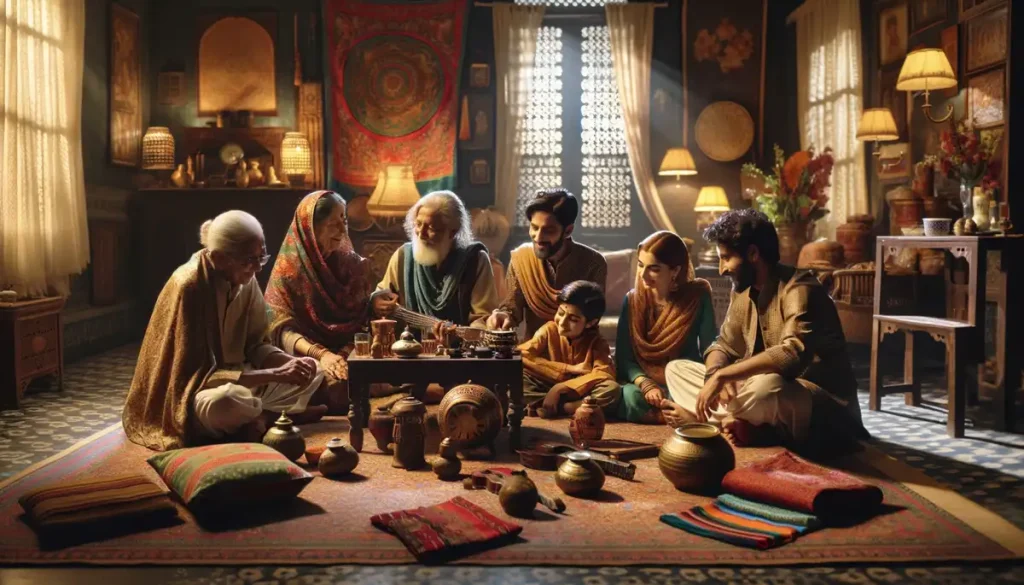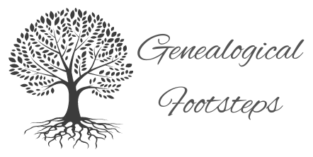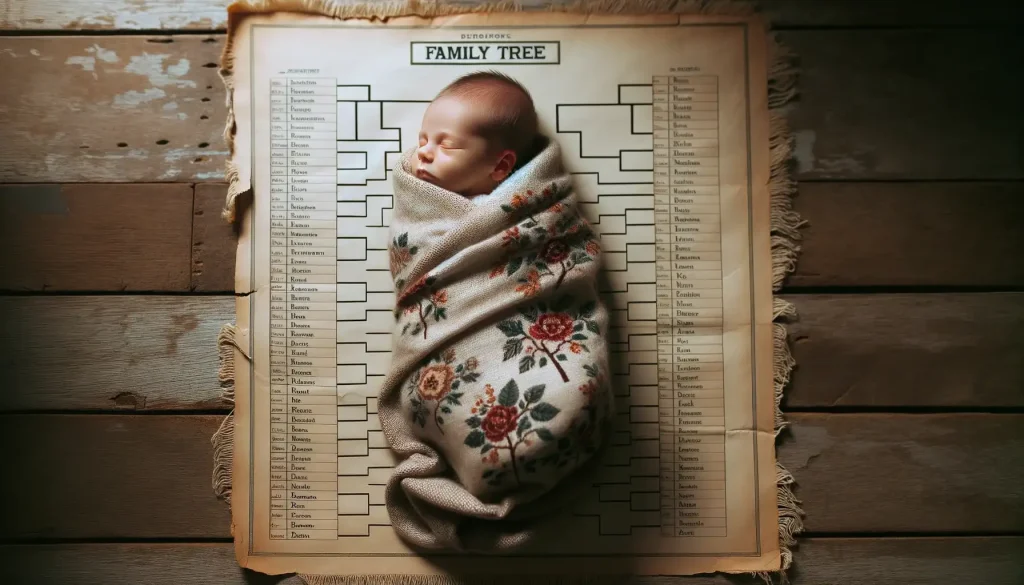Losing touch with family traditions can be a common occurrence, especially in today’s fast-paced and rapidly changing world. These traditions play an integral role in shaping cultural identity and provide a connection to one’s heritage. Fortunately, it’s never too late to reconnect with lost family traditions and rediscover cultural heritage.
Preserving cultural practices is essential in maintaining a sense of continuity between generations, and it can be a personally enriching experience. Through rediscovering lost customs and embracing ancestral practices, individuals can gain a deeper understanding of their family’s history, traditions and values.
This guide explores the significance of lost family traditions, provides practical tips on how to reclaim ancestral customs, and highlights the importance of preserving intergenerational rituals. Whether it be finding lost customs or unearthing forgotten family customs, there are many ways to embrace and preserve ancestral practices.
Key Takeaways
- Rediscovering and reviving lost family traditions is vital for maintaining cultural heritage.
- Preserving cultural practices helps maintain continuity between generations and enriches personal understanding of family history and values.
- Lost family traditions are crucial to cultural heritage, and their preservation benefits future generations.
- Uncovering lost family traditions involves speaking with older relatives, researching family history, and exploring cultural resources.
- Reclaiming family rituals involves researching family history, reintroducing family activities, personalizing traditions, storytelling, and participating in cultural events.
- Documenting and preserving cultural practices for future generations is essential, utilizing oral histories, written documentation, and modern technology.
- Integrating lost family traditions into daily life can be done through cooking traditional foods, observing cultural holidays, creating family heirlooms, and incorporating ancestral languages.
- Celebrating cultural heritage through events and festivals helps reconnect with lost family traditions and cultural identity.
- Ensuring intergenerational continuity of traditions requires shared experiences, education, and adapting customs to modern lifestyles.
- Overcoming challenges in preserving cultural identity involves adapting traditions to modern life, using digital media, and storytelling.
Understanding the Significance of Lost Family Traditions
Lost family traditions are an essential part of one’s cultural heritage, and their preservation is crucial for future generations. The passing down of ancestral traditions and intergenerational rituals is a manifestation of a community’s shared history, cultural identity, and values.
Preserving cultural practices helps one stay connected to their roots and maintain a sense of identity and belonging. These customs represent the unique aspects of one’s family culture and reflect the beliefs and value systems of generations past.
Ancestral traditions are not just practices or beliefs; they are a way of life. They provide a sense of continuity and enable individuals to connect with their past, present, and future. Losing these customs can result in a sense of disconnection and loss of cultural identity.
Moreover, preserving cultural practices has social, emotional, and psychological benefits. It strengthens family bonds and provides a sense of community as individuals come together to celebrate and honour their shared heritage.
Intergenerational rituals, such as holiday celebrations, weddings, and funerals, create a space for families to connect and reinforce their shared values and beliefs. These practices are a testament to a family’s history and provide a unique perspective on how previous generations have lived.
Uncovering Lost Family Traditions: Where to Begin
Discovering lost family traditions can be a daunting task, especially if one is unsure where to start. The process requires a combination of personal curiosity and historical research.
Here are some tips on getting started:
- Talk to older relatives: The first step in uncovering lost family traditions is to speak with older relatives who may have knowledge of customs and practices passed down through generations. These conversations can provide valuable insight into the family’s cultural heritage.
- Research family history: Delving into family history and genealogy can provide clues to lost family traditions. This can involve searching historical documents, exploring family trees, and even visiting ancestral homes or locations.
- Explore cultural resources: Public libraries, historical societies, and cultural organisations can be valuable resources for uncovering lost family traditions. Researching cultural traditions and customs can also provide context and background information.
Remember:
Uncovering lost family traditions requires patience and persistence. Not all information may be readily available, and some traditions may have been lost over time. However, with dedication and perseverance, it is possible to rediscover and revive ancestral practices.

Reclaiming Family Rituals: Bringing the Past into the Present
Reclaiming family rituals is an essential part of cultural rediscovery. It is a way to revive ancestral traditions and embrace ancestral practices in a modern context. It is an opportunity to preserve intergenerational rituals and pass them down to future generations. Here are some practical steps to take when reviving lost family traditions:
1. Research
Start by researching your family history. Look for clues and insights into lost family traditions. You may be able to find information in family archives, old photo albums, and family heirlooms. Talk to older relatives and ask them about their memories of family customs and traditions. Consider using online resources, such as genealogy websites and cultural archives, to help you piece together your family’s cultural heritage.
2. Reintroduce Family Activities
Reintroduce family activities that were once commonplace. These may include cooking traditional family meals, playing games, or participating in cultural festivals. By doing so, you can revive intergenerational rituals and create new memories with your family. It may be particularly effective to involve younger family members in these activities, ensuring that traditions are passed down to future generations.
3. Personalise Traditions
Make lost family traditions your own by personalising them. Consider how you can adapt customs to fit modern lifestyles while still honouring the essence of ancestral traditions. For example, if your family has a tradition of gathering for Sunday lunch, you can personalise it by changing it to Sunday brunch or dinner to accommodate different schedules. This will help make the tradition relevant to current family members and ensure its continuity.
4. Tell the Family Story
Storytelling is an excellent way to pass down family traditions. Share stories about your ancestors and their customs with younger family members. By doing so, you can help them connect with their cultural heritage and create a sense of family identity. You may also consider recording family stories and traditions in a book or through digital media to help preserve them for future generations.
5. Participate in Cultural Events
Participating in cultural events is an excellent way to celebrate lost family traditions and reconnect with one’s cultural heritage. Consider attending cultural festivals or joining ethnic associations. These events provide opportunities to learn more about your family’s customs and traditions and to connect with other individuals who share similar backgrounds.
Documenting and Preserving Cultural Practices
In order to ensure the longevity of lost family traditions, it is important to document and preserve cultural practices for future generations. This can involve finding lost customs and unearthing forgotten family customs that may have been lost over time. Rediscovering cultural heritage is a crucial step in preserving the history and identity of a family or community.
One way to document cultural practices is through oral history interviews. This involves recording the stories and experiences of older relatives who may have first-hand knowledge of family traditions. Written documentation, such as family recipes, diaries, and letters, can also provide insights into the customs and rituals of previous generations.
Modern technology offers additional opportunities for preserving cultural practices. Digital media, such as photos and videos, can capture important moments and events, and provide a means of sharing them with others. Social media platforms can also be used to connect with other individuals and communities who may have similar cultural heritage.
Archiving and sharing these practices is key to ensuring their continuity. By creating a repository of cultural practices, the next generation can be introduced to the customs and traditions of their ancestors, and learn about their cultural identity in a meaningful way.

Incorporating Family Traditions into Everyday Life
Integrating lost family traditions into daily routines can be a fulfilling way of reconnecting with heritage and reclaiming family rituals. It also allows individuals to preserve intergenerational rituals and pass them down to future generations. Here are some practical tips on how to incorporate ancestral practices into everyday life:
- Cook traditional foods: Cooking and sharing traditional family recipes is an excellent way to connect with heritage and keep cultural practices alive. It is an opportunity to bring family members together and explore the flavours, smells, and stories associated with family cuisine.
- Observe cultural holidays: Celebrating cultural holidays is a great way to honour family traditions and embrace ancestral practices. It provides opportunities to learn about cultural history and participate in communal rituals, such as dancing or singing.
- Create family heirlooms: Crafting handmade items or passing down personal treasures can be an effective way of preserving family traditions and ensuring intergenerational continuity. Creating family heirlooms also provides an opportunity to tell stories and share memories.
- Incorporate language: Learning and using the language of one’s ancestors can be a powerful way of reclaiming family customs. It allows for a deeper understanding of cultural practices and promotes cultural identity.
Remember, the goal is not to replicate ancestral practices exactly but to adapt them to fit modern lifestyles while still honouring their essence. Maintaining flexibility and open-mindedness is key to successfully incorporating family traditions into everyday life.
Celebrating Cultural Heritage: Events and Festivals
One of the most exciting ways to reconnect with cultural heritage is through events and festivals.
Attending cultural festivals is an opportunity to witness the richness and diversity of lost family traditions and rediscovering cultural heritage. Festivals bring together communities in celebrating traditions and customs from around the world.
These events are perfect for embracing ancestral practices and preserving intergenerational rituals. Festivals allow individuals to immerse themselves in cultural experiences such as dance, music, food and crafts.
Many cultural festivals also offer educational programs and workshops, which provide an excellent learning opportunity for all ages. Individuals can learn about the history and significance of lost family traditions, and how they have evolved over time.
Attending cultural festivals also provides a chance to connect with others who share similar cultural backgrounds, creating a sense of community and belonging.
Passing Down Traditions: Ensuring Intergenerational Continuity
Preserving intergenerational rituals is crucial for maintaining family connections and passing down cultural heritage. Without intentional effort, family traditions can be lost over time, resulting in a disconnection from one’s cultural identity. However, with a commitment to embracing ancestral practices and reconnecting with heritage, intergenerational continuity can be achieved.
One strategy for preserving intergenerational rituals is to create opportunities for shared experiences. By engaging in family customs together, younger generations can develop a sense of belonging and understanding of their cultural heritage. This can be achieved through regular family gatherings, cultural events, or even virtual experiences.
Education is also key to passing down traditions. Sharing family history and the significance of customs with younger generations can help to instil a sense of pride and respect for cultural heritage. Storytelling is a powerful tool for transmitting family traditions, as it allows for the preservation of oral histories and personal connections.
It can also be helpful to adapt customs to fit modern lifestyles while still honouring the essence of ancestral traditions. This can involve incorporating new traditions into existing practices or finding innovative ways to celebrate old ones. By making traditions relevant and accessible to younger generations, intergenerational continuity can be maintained.

Overcoming Challenges and Preserving Cultural Identity
Preserving lost family traditions and reconnecting with one’s cultural heritage can be a rewarding experience, but it is not always easy. There are several challenges that individuals may face when attempting to embrace ancestral practices and preserve intergenerational rituals. Overcoming these hurdles is crucial to maintaining cultural identity and keeping family traditions alive.
One of the greatest challenges of preserving lost family traditions is adapting them to fit modern lifestyles. As society changes, it can be difficult to find the time and resources to maintain traditional practices. Additionally, geographical distance can make it challenging to participate in ancestral events or ceremonies that take place in other parts of the world.
Another challenge faced when reconnecting with heritage is the generational gap between older relatives who remember the traditions and younger family members who may not have grown up with them. It may be difficult to pass along traditions and ensure the continuity of cultural practices when there is a lack of understanding or interest among younger generations.
Despite these challenges, it is important to remember the significance of cultural identity and preserving intergenerational rituals. There are strategies individuals can employ to overcome these obstacles and stay connected to their ancestral heritage.
One such strategy is to simplify and adapt ancestral practices to fit modern lifestyles. For example, instead of participating in a multi-day event, individuals may opt to celebrate a specific aspect of the tradition in a shorter, more manageable time frame. Additionally, using digital media to stay connected with family members who live far away can help maintain a sense of community and shared cultural experience.
Storytelling and education are also critical to passing down intergenerational rituals. Older relatives can share stories and memories of family traditions, providing younger family members with a deeper understanding of their cultural identity. Cultural resources such as books, movies, and museums can also be useful in educating family members and fostering a sense of connection to ancestral heritage.
Ultimately, preserving lost family traditions and maintaining cultural identity requires effort and dedication. However, the benefits of reconnecting with heritage and embracing ancestral practices can be immeasurable, providing a sense of belonging and connection to something greater than oneself.
Lost Family Traditions – The Last Word
Reviving lost family traditions is a crucial aspect of cultural rediscovery. By reconnecting with heritage and preserving cultural practices, individuals can forge a stronger sense of identity and community. It is the responsibility of each generation to ensure the continuity of intergenerational rituals and to pass down ancestral practices to future generations.
Embracing ancestral practices has numerous benefits, from fostering personal growth and well-being to strengthening communal ties. It is essential to document and share lost family traditions, so they do not disappear from memory.
Celebrating cultural heritage through events and festivals is an excellent way to immerse oneself in family traditions and stay connected with cultural identity. Adapting customs to fit modern lifestyles while still honouring the essence of ancestral traditions is crucial to preserve cultural practices.
Embracing the Journey of Cultural Rediscovery
Overcoming challenges and maintaining cultural identity requires perseverance and dedication. It is essential to stay curious and open-minded, and to seek out resources and support to help navigate the journey of cultural rediscovery. By embracing and preserving lost family traditions, individuals can enrich their lives and create a meaningful connection with their ancestral heritage.
So, take the first step to reconnect with your heritage, and embark on the journey of preserving and embracing ancestral practices. It is time to unearth forgotten family customs and revive intergenerational rituals, ensuring that cultural traditions remain a vital part of our lives and communities for generations to come.
FAQs
Q: What are the benefits of rediscovering lost family traditions? A: Rediscovering lost family traditions offers numerous benefits, including strengthening family bonds, maintaining cultural heritage, and providing a sense of continuity between generations. It enriches personal understanding of family history and values, and helps individuals connect with their roots, fostering a sense of identity and belonging.
Q: How can I start uncovering lost family traditions? A: Begin by talking to older relatives who may have knowledge of customs passed down through generations. Research your family history, exploring historical documents, family trees, and ancestral locations. Utilize public libraries, historical societies, and cultural organizations for additional resources. Remember, patience and persistence are key, as some information may not be readily available.
Q: What are some practical ways to revive lost family traditions? A: To revive lost family traditions, start by researching your family history for clues about past customs. Reintroduce family activities like traditional meals or games. Personalize traditions to fit modern lifestyles, and involve younger family members to ensure these customs are passed down. Storytelling and participating in cultural events are also effective ways to reconnect with and preserve these traditions.
Q: What challenges might I face in preserving family traditions and how can I overcome them? A: Challenges in preserving family traditions include adapting them to modern lifestyles and bridging generational gaps. Overcome these by simplifying and adapting practices, using digital media to connect with distant family members, and educating younger generations about the significance of these customs. Storytelling and using cultural resources can also help in maintaining these traditions.
Q: Why is it important to integrate family traditions into everyday life? A: Integrating family traditions into daily life helps maintain a connection to cultural heritage and reinforces family identity. It can be done through cooking traditional foods, observing cultural holidays, creating family heirlooms, and incorporating ancestral languages. This practice ensures that traditions remain a living part of the family’s culture, adapting to modern contexts while preserving their essence.
A Poem From Me To You…
Sweet Threads of Time In the attic's light, where memories reside, Dusty boxes, secrets they hide. Grandma's recipes, tales untold, Echoes of laughter, young and old. Pages yellowed, edges worn, In each of the line, tradition reborn. Whispers of the past, gentle and kind, In these rituals, our hearts entwined. Old stories bloom, new smiles begin, We weave the past, in the present we spin. Through shared meals, and songs that drift, In our hands, time's precious gift. Reviving customs, a family's embrace, In every gesture, ancestors' grace. In this dance of old and new, We find our roots, and love anew.
COPYRIGHT NOTICE
Please be advised that all images, designs, and creative content on this page are the exclusive property of GenealogicalFootsteps.co.uk and are protected under international copyright laws. The images may not be reproduced, copied, transmitted or manipulated without the written permission of GenealogicalFootsteps.co.uk.
Unauthorised use, distribution, display, or creation of derivative works of any images contained on this page, is strictly prohibited and can lead to legal penalties. We actively monitor for, and enforce, our copyright interests. If you wish to use any of our images, kindly contact us to seek permission. Respect of copyright is not merely a legal requirement but also an acknowledgement and support of the hard work and creativity that goes into producing them.
Thank you for your understanding and cooperation.
© 2023, GenealogicalFootsteps.co.uk. All Rights Reserved.

My name is Anthony, the founder of Genealogical Footsteps. I have over 20 years of dedicated experience in family history and genealogy (although I am not a professional genealogist). I hold BA in history, and am considering further education (despite my age). My journey in genealogy has led me to remarkable discoveries and projects, particularly where my Cypriot genealogy is concerned. I am passionate about uncovering the stories behind names and have helped friends and family connect with their heritage, including those with Cypriot, Celtic, and Viking ancestry. Click here to read more about me.



